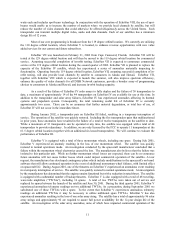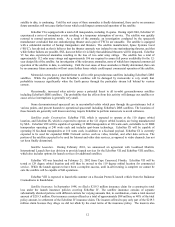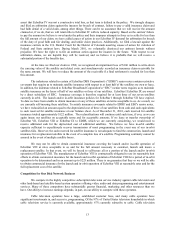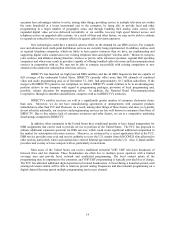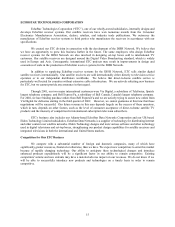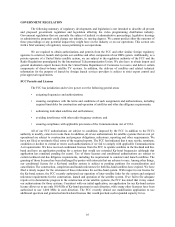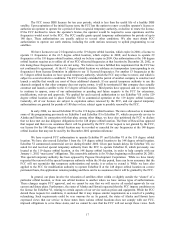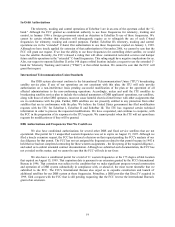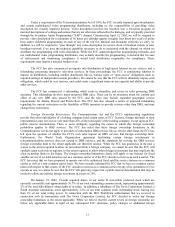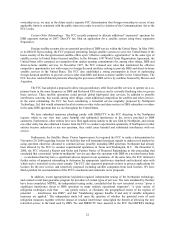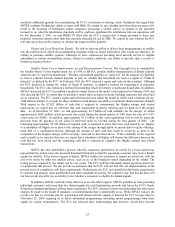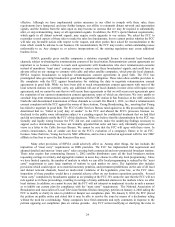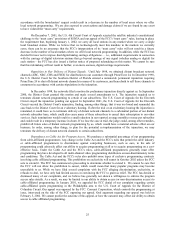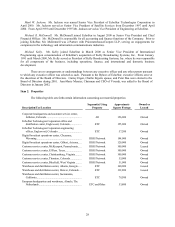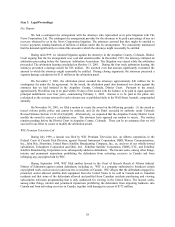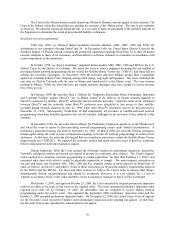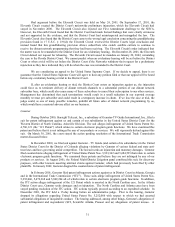Dish Network 2001 Annual Report Download - page 23
Download and view the complete annual report
Please find page 23 of the 2001 Dish Network annual report below. You can navigate through the pages in the report by either clicking on the pages listed below, or by using the keyword search tool below to find specific information within the annual report.21
Under a requirement of the Telecommunications Act of 1996, the FCC recently imposed upon broadcasters
and certain multichannel video programming distributors, including us, the responsibility of providing video
description for visually impaired persons. Video description involves the insertion into a television program of
narrated descriptions of settings and actions that are not otherwise reflected in the dialogue, and is typically provided
through the Secondary Audio Programming (“SAP”) channel. Commencing April 12, 2002, we will be required to
provide video description for a minimum of 50 hours per calendar quarter (roughly four hours per week) of prime
time and/or children’s programming on each of any of the top five national non-broadcast networks we carry. In
addition, we will be required to “pass through” any video description we receive from a broadcast station or non-
broadcast network if we have the technical capability necessary to do so associated with the channel on which we
distribute the programming with video description. While the FCC acknowledged that programming networks, and
not multichannel video programming distributors, may actually describe the programming, it declared that for ease
of enforcement and monitoring compliance it would hold distributors responsible for compliance. These
requirements may impose a material burden on us.
The FCC has also commenced an inquiry into distribution of high-speed Internet access services and a
rulemaking concerning interactive television services. In these proceedings, the FCC is considering whether to
impose on distributors, including satellite distributors like us, various types of “open access” obligations (such as
required carriage of independent content providers). We cannot be sure that the FCC will not ultimately impose such
obligations, which could be very onerous, and could create a significant strain on our capacity and ability to provide
other services.
The FCC has commenced a rulemaking which seeks to streamline and revise its rules governing DBS
operators. This rulemaking involves many proposed DBS rules. There can be no assurance about the content and
effect of any new DBS rules passed by the FCC, and the rules may include expanded geographic service
requirements for Alaska, Hawaii and Puerto Rico. The FCC has also released a notice of proposed rulemaking
regarding the current restrictions on the flexibility of DBS operators to provide services other than DBS, and may
change these restrictions.
Foreign Ownership Restrictions. The Communications Act and the FCC's implementing regulations
provide that when subsidiaries of a holding company hold certain types of FCC licenses, foreign nationals or their
representatives may not own or vote more than 25% of the total equity of the holding company, except upon an FCC
public interest determination. There is some ambiguity regarding the extent to which this foreign ownership
prohibition applies to DBS services. The FCC has ruled that these foreign ownership limitations in the
Communications Act do not apply to providers of subscription DBS services like us. On the other hand, the FCC has
left open the question of whether the FCC’s own rules impose on DBS services that foreign ownership limit.
Furthermore, the World Trade Organization agreement facilitating certain foreign investments in
telecommunications services does not extend to DBS services, and the standards for waiving the DBS services
foreign ownership limit to the extent applicable are therefore unclear. While the FCC has granted us in the past a
waiver to the extent required to allow an investment from a foreign company, we cannot be sure that the FCC will
similarly grant such waiver requests, to the extent required to allow other foreign investments that may implicate the
alien ownership limits in the future. The foreign ownership limitations clearly will apply to our licenses for fixed
satellite service if we hold ourselves out as a common carrier or if the FCC decides to treat us as such a carrier. The
FCC has noted that we have proposed to operate one of its authorized fixed satellite service systems on a common
carrier as well as a non-common carrier basis. We have recently informed the FCC that we have no common carrier
plans with respect to that system. If the FCC decides to treat us as a common carrier for any of its operations or if we
operate as one, we cannot be sure that the FCC will grant any request for a public interest determination that may be
needed to allow any indirect foreign investment in excess of 25%.
On January 22, 2002, Vivendi acquired shares of our series D convertible preferred stock which are
currently convertible into approximately 10.7% of our total outstanding common stock, representing approximately
2% of the total fully-diluted voting rights of us today. In addition, a subsidiary of The News Corporation Limited, a
South Australia corporation, owns approximately 2.2% of our total common stock outstanding stock, having less
than 1% of our total voting power. In connection with the MCI WorldCom authorization that we received in
connection with its transactions with The News Corporation Limited, the FCC decided to waive any foreign
ownership limitations to the extent applicable. While we believe that the current levels of foreign ownership are
below any applicable limit, in light of any subsequent FCC decisions, policy changes or additional foreign


